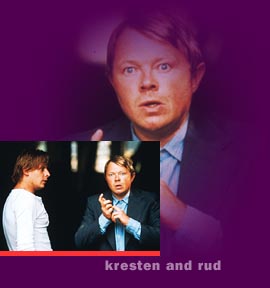Music played on a bent drain-pipe? An instrumentalist hiding in a ditch as he plays?
You have to think along creative, untraditional lines when shooting a Dogma film. According to the ten strict rules of Dogma 95, drawn up four years ago by Danish directors Lars Von Trier and Thomas Vinterberg, the music has to be recorded along with the images. Naturally, Søren Kragh-Jacobsen obeyed this rule while making "Mifune"—just as he has faithfully adhered to the other Dogma Commandments (now dubbed the "Vow of Chastity"), which include the mandatory use of handheld cameras, a ban on artificial lighting and props brought in from off set, and insistence on a plot that takes place here and now, without "superficial action" (i.e., no guns or murder).
"When Lars and Thomas asked me if I'd make the third Dogma film, I had no doubt that I'd agree," the director says. "At the time I thought I'd lost the spontaneity that had always fueled me, and I thought I had become more and more caught up in the technical aspects of filmmaking, so when I was asked to join the Dogma brotherhood my only stipulation was that there should be film in the camera."
Since the qualified electrical engineer made his convincing debut in 1978 with "Do You Wanna See My Beautiful Bellybutton?," Søren Kragh-Jacobsen has made a long line of features including "Rubber Tarzan," "Thunderbirds," "Emma's Shadow," "The Boys from St. Petri," and most recently, "The Island on Bird Street." Regarding "Mifune," he says, "at first I had no idea where I was headed with this project. Lars knew where he was going when he started on 'The Idiots' and I envied him. But making films can be a pretty lonely business, and Dogma 95 had a subtext—things should be a bit more sociable—and that's how they turned out. In the meantime, I threatened to make a film in a major key, because I wanted to acknowledge my own triteness."
The idea for the original Danish title ("Mifunes Sidste Sang," literally "Mifune's Last Song") came to Kragh-Jacobsen when the great Japanese actor Toshiro Mifune died in 1997. In "The Seven Samurai" by Akira Kurosawa, Mifune plays a bogus samurai of peasant origins. There is a parallel here to the lead in "Mifune"—a successful careerist who keeps his humble past a secret.
Most of Kragh-Jacobsen's film was shot in six weeks on an abandoned farm situated on the featureless flatness of Denmark's southernmost island. The film unit slept in caravans and the cast brought their own clothes to wear on camera. "The script wasn't finished until four days before shooting was due to start, and that suited us just fine," says Kragh-Jacobsen. "I wanted to get away from contrived drama, back to the family and the small scale play. I wanted to make an affectionate, optimistic summer film." Kragh-Jacobsen wrote the script for "Mifune" with the help of professional script-doctor Mogens Rukov and the young director and writer Anders Thomas Jensen, who is closer in age to the leading characters than to Kragh-Jacobsen.
Surprisingly, it rained most of last summer in Denmark while Kragh-Jacobsen was shooting "Mifune." The unexpected weather, however, lent the film a visual style he is very happy with.
Unlike "The Idiots" and "The Celebration," the previous two Dogma films, "Mifune" was not shot on video; the reason being that, although video allows the director to shoot far more, it takes longer to work on in the editing suite. Kragh-Jacobsen did not think that this technique suited the story he wanted to tell—nor does he consider anything revolutionary about the use of handheld cameras. "Of course I could have made a 'Søren Goes Absurd' film—but I am not Lars Von Trier," he says. "I am a realist, a storyteller, and have stayed within my own tradition and kept to the Dogma rules at the same time. They did not prove to be a straitjacket in any way. On the contrary, it was the most purifying filmmaking experience I've had since 'Rubber Tarzan.'" He admits that he bent the rule on using available props a bit—pruning a few bushes in an overgrown farm garden and borrowing a few chickens from the farm next door.
"Dogma 95 has turned out to be a superb commercial step, even though it wasn't conceived as such. It's liberation from the way a director can be raped by technology, the fact that you can be tyrannized by all the expensive gear, the cranes, filters, dollies, and spotlights. In that area we can't beat the American's anyway, so we Europeans should head in another direction." The Danish director wanted to show Kresten watching his favorite film, "The Seven Samurai," on video. But, although Kragh-Jacobsen went as far as getting in touch with the wife of the now deceased Kurosawa (who answered "the master is tired"), it proved impossible to obtain permission to show any scenes from the Japanese masterpiece. Nevertheless, Kragh-Jacobsen is pleased with the title of his film because he thinks that "Mifune" is a word that feels good on the tongue and "tastes just like a boiled sweet."
—from Ebbe Iversen's article in Berlingske Tidende

| Read Dogma 95's VOW OF CHASTITY Read the director's CONFESSION to Dogma 95 |